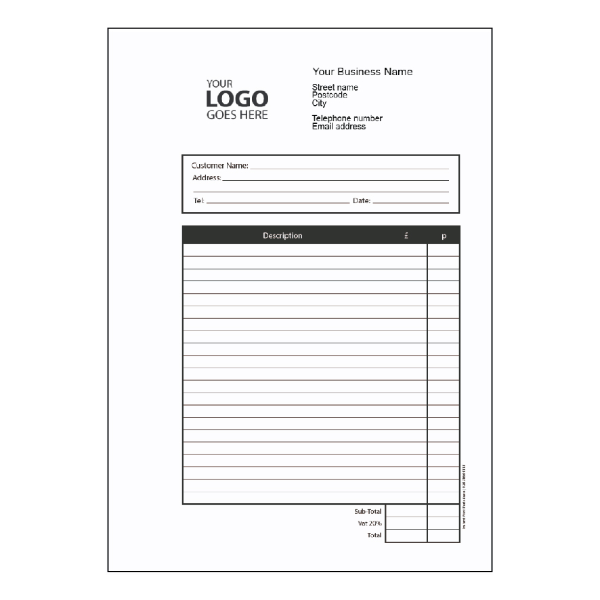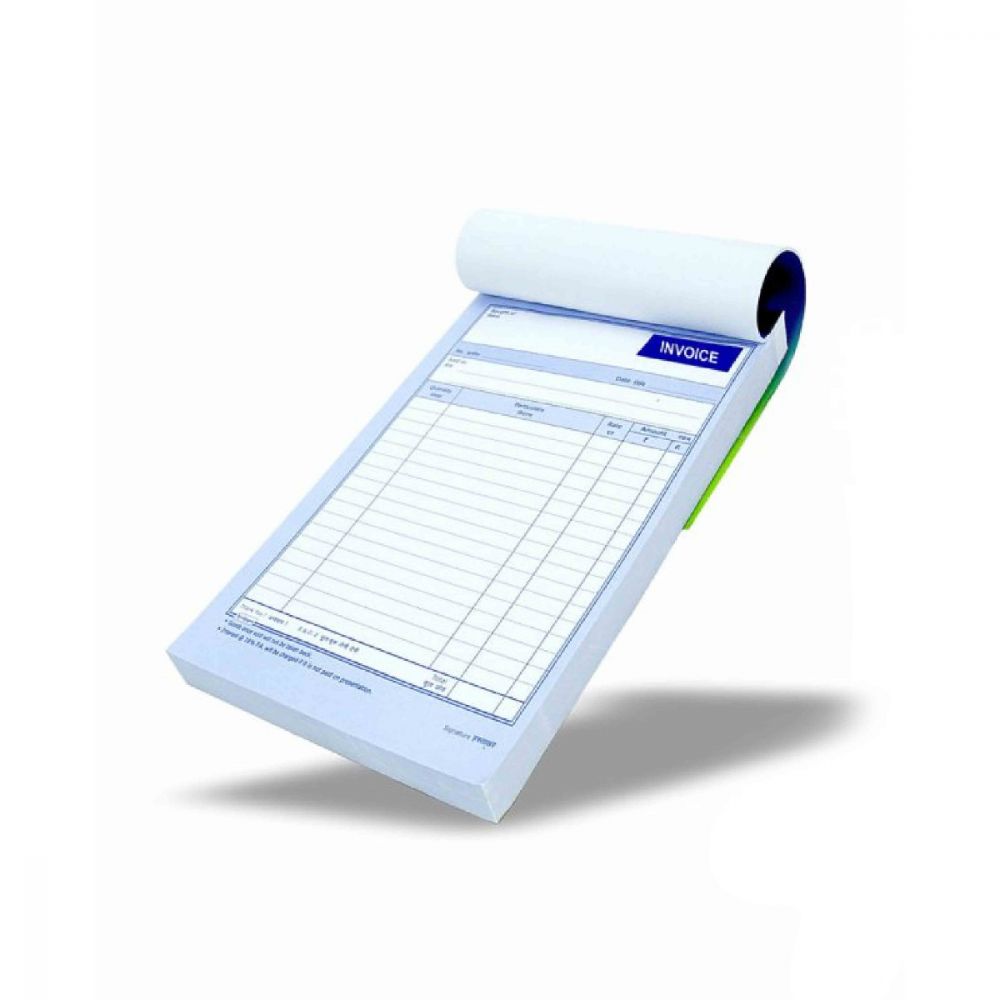FAQs about invoice book formats — what business owners need to know
Leading Tips for Successfully Taking Care Of Finances With an Invoice Book in Your Company
Effective financial administration is essential for any type of company, and an invoice book plays a substantial function in this process. It functions as a crucial device for monitoring earnings and expenditures while ensuring timely payments. Selecting the appropriate billing publication and arranging billings effectively are fundamental actions. Nonetheless, there are added strategies to boost overall efficiency. Understanding these methods can significantly impact a business's financial security and development possibility. What are one of the most efficient practices to contemplate?
Understanding the Relevance of an Invoice Book
An invoice book functions as a vital device for services seeking to keep arranged monetary records. It permits business to document purchases systematically, guaranteeing that all sales and services rendered are precisely tape-recorded. This systematic documents is necessary for tracking income, checking money flow, and taking care of expenses.Moreover, an invoice publication aids in maintaining professionalism and reliability in business negotiations. Giving clients with detailed billings enhances reliability and trust, promoting more powerful client partnerships. Furthermore, it streamlines the procedure of filing taxes, as all essential monetary details is easily available and arranged.
Choosing the Right invoice book for Your Service
Picking the suitable invoice book is essential for companies seeking to simplify their financial management. The option commonly hinges on a number of crucial variables, consisting of the nature of the business, the volume of deals, and details invoicing demands. Little services with less transactions could profit from a straightforward, pre-printed billing book, while larger enterprises may require customized options that permit for thorough inventory and branding.Additionally, services ought to consider whether they prefer a physical or electronic style. Digital invoice publications can provide enhanced functions like automatic computations and easy data storage space, while physical publications provide a tangible document. It is also essential to examine guide's format for clarity and convenience of use. Ultimately, the ideal invoice publication will certainly not just assist in effective invoicing yet additionally add to much better capital monitoring and boosted client relations.
Organizing Your Invoice for Easy Gain Access To
Organizing billings efficiently is important for any organization, as it guarantees fast accessibility to essential financial documents when needed. A methodical approach can boost effectiveness and lower stress and anxiety during audits or monetary analyses. It is advisable to categorize invoices by type, client, or day, permitting uncomplicated retrieval. Using color-coded folders or identified areas within a billing publication can promote this procedure, making certain that papers are conveniently identifiable at a glance.Moreover, keeping an electronic back-up of physical billings can supply an additional layer of protection and accessibility. On a regular basis evaluating and removing out-of-date invoices will aid keep the system workable, stopping mess. Establishing a regular for organizing and saving invoices, whether day-to-day or weekly, can significantly improve financial operations. By focusing on organization, services can save time, reduce errors, and sustain far better financial decision-making, ultimately resulting in improved general administration of finances.
Keeping An Eye On Repayments and Due Dates
Tracking repayments and due dates is important for maintaining monetary stability. Organizing repayment schedules can aid individuals handle their cash money flow efficiently while lessening late fees. Furthermore, establishing tip informs assurances that no repayment due dates are ignored.
Organize Payment Routines
Establishing a clear repayment routine is crucial for preserving monetary security and guaranteeing prompt capital. Businesses can profit from organizing payment timetables by classifying billings according to their due dates. This method permits very easy identification of upcoming payments, making it possible for positive monitoring of money resources. By segmenting billings right into weekly or monthly timelines, companies can focus on critical repayments while also evaluating patterns in money inflow. In addition, a structured timetable help in projecting future monetary demands, which is considerable for budgeting purposes. Constantly assessing and updating repayment routines ensures that no due dates are missed out on, fostering solid partnerships with customers and vendors. Inevitably, a reliable settlement schedule boosts overall financial monitoring and sustains a service's growth objectives.
Establish Suggestion Alerts
Just how can services assure they never ever miss out on a payment deadline? One reliable strategy includes setting pointer informs. By implementing automated tips, services can assure prompt alerts for upcoming settlements and due days. invoice book. This can be attained with different approaches, such as calendar applications, invoicing software, or dedicated suggestion apps.These signals can be configured to notify customers days or perhaps weeks beforehand, enabling adequate time for prep work. In addition, organizations ought to think about categorizing suggestions based on concern, guaranteeing that vital repayments get unique focus. By regularly making use of tip alerts, companies can enhance their cash circulation monitoring and keep favorable connections with clients and distributors. Ultimately, this proactive technique reduces the danger of late fees and fosters economic security

Implementing Constant Billing Practices
Although numerous organizations identify the significance of timely settlements, executing consistent payment techniques frequently verifies challenging. Establishing a standard invoicing process can noticeably boost capital management. This includes setting certain periods for releasing invoices, whether weekly, bi-weekly, or monthly, depending upon the nature of the company and customer relationships.Furthermore, companies should ensure that invoices are clear and detailed, laying out services provided, payment terms, and due days. Making use of an organized technique to act on exceptional billings is equally vital; pointers can be automated to maintain expertise and consistency.Additionally, educating personnel on the billing process can promote liability and precision, lowering errors that might delay repayments. Frequently assessing and readjusting billing practices can help services remain straightened with sector standards and client assumptions, ultimately advertising a much healthier financial environment. Consistency in these techniques not only enhances performance but also develops trust fund with customers.
Using Invoice Templates for Efficiency
Using billing design templates can significantly enhance the efficiency of the billing development process. By streamlining this job, organizations can save time and decrease mistakes, look at more info enabling quicker payment cycles. Additionally, customizing themes for branding functions assurances that billings mirror the business's identity, reinforcing professionalism and trust in customer communications.
Simplifying Invoice Creation Process
Enhancing the invoice production process can substantially improve an organization's efficiency and accuracy. invoice book. By using pre-designed billing templates, organizations can lessen time invested in composing billings from the ground up. These templates typically consist of crucial areas, such as client information, itemized solutions, and repayment terms, guaranteeing that all necessary information are caught consistently.Furthermore, employing invoice software program can automate computations and decrease the likelihood of human error. This not just speeds up the process yet also boosts record-keeping by keeping a digital archive of all invoices provided. Furthermore, standardized layouts can promote quicker testimonials and authorizations within business, making it possible for timely payment and boosting capital. In general, a reliable billing creation process is essential for keeping economic health in an open market
Tailoring Templates for Branding
Personalizing billing layouts for branding can significantly improve a business's professional picture while making certain efficiency in the invoicing process. By including firm logos, color design, and typography that show the brand name identification, companies develop a cohesive appearance that promotes trust and recognition among customers. Customized templates can likewise streamline data entry by including pre-filled fields for client details and solutions used, reducing mistakes and conserving time. In addition, consisting of my site personalized messages or terms of service can strengthen customer partnerships. Businesses should consistently review and update their invoice designs to align with any type of branding modifications, making sure that their payment procedure continues to be an expansion of their brand name. This strategic approach not only boosts effectiveness however likewise reinforces the brand name's visibility in the market.
Consistently Evaluating Your Financial Wellness

Often Asked Inquiries
Just how Frequently Should I Update My invoice book?
The regularity of upgrading an invoice publication differs by organization demands. Usually, it is suggested to upgrade it regularly, preferably after each purchase, to preserve precise records look at these guys and facilitate reliable economic administration.
Can I Use Digital Invoices Instead of a Physical Publication?
The inquiry of using digital billings rather than a physical publication suggests a shift in the direction of modern-day monetary administration - invoice book. Digital invoices supply ease and access, enabling services to improve procedures, minimize paper waste, and improve record-keeping efficiency
What Should I Do if a Billing Is Lost?
If a billing is lost, the person ought to promptly alert the client, edition a duplicate invoice, and record the situation for record-keeping. Keeping a clear communication trail can protect against prospective misunderstandings or conflicts.

Just how Do I Deal With Late Settlements Efficiently?
Managing late payments properly includes sending out respectful pointers, developing clear settlement terms upfront, and preserving open interaction with customers. Implementing a structured follow-up procedure can greatly decrease hold-ups and boost cash flow for the service.
Is It Necessary to Keep Copies of Expired Invoices?
The requirement of maintaining copies of ended billings varies by market and lawful needs. Some businesses keep them for referral, audits, or tax obligation objectives, while others may discard them, depending upon their operational requirements and plans.